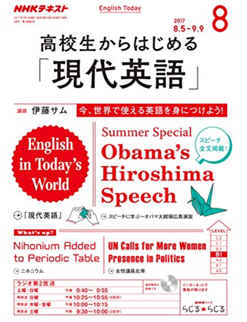オバマ広島演説暗唱用「ハイライト版」
英語授業・反訳大会などの素材としてお使いください。元の演説は長すぎるため、論旨を保ったまま5分程度に縮め、表記もシンプルに編集したものです。
これだけで一つのスピーチとして成立する暗唱(反訳)用決定版です。NHK講座のために用意したものですが、ケネディ演説を暗唱した経験から、英語反訳大会などの素材として役立てるように、自然な流れのままにハイライト版を作成しました。
初出 NHK「高校生からはじめる現代英語」2017/8 反訳用の対訳・解説はこちらにあります。
■オバマ演説「ハイライト版」で学習しましょう
皆さんこんにちは、伊藤サムです。夏をいかがお過ごしでしょうか。講座のスタイルにもだいぶ慣れてきたころかと思いますが、8月の第1週と第2週は、<特別企画>としてオバマ大統領広島演説(2016年5月)を4回にわたってお送りします。構成も通常のニュースのページとは異なりますのでご注意ください。
語学的なポイントを学ぶとともに、核兵器を使用した国の大統領が被爆地を訪れて核廃絶について語る歴史的な演説から、「戦争と平和」「理想と現実」など普遍的な問題について考えることもできるでしょう。
大統領演説といえば格調高い表現が満載、英語学習の素材として昔から利用されてきました。私も高校生のときに英語暗唱大会のためにケネディ大統領就任演説を暗記し、これを覚えたことは一生の財産になっています。
オバマ演説も暗唱大会の素材などに利用できると思います。授業やサークルで「反訳」大会を開いてみるのもいいかもしれません。普遍的なテーマなので、ディスカッションやディベートの準備素材としても利用できるでしょう。
オバマ演説(17分間)はそのままでは長いため、通常スピードで読んで計5分間程度になるように抜粋したものが、今月号の教材です。論旨とスピーチの流れを保ち、格調高くて学習効果が高い部分を優先して残し、政治的に敏感な部分を割愛しました。抜粋ですが、これだけでも一つのスピーチとして成立する暗唱用決定版、オバマ演説「ハイライト版」です。ぜひ活用してください。
■オバマ広島演説「ハイライト版」全文
論旨が乱れないように主要部分を抜粋し、原文の半分の長さに縮めたものです。原文は1451語あり、17分間の長さです。このハイライト版は681語ほどです。不自然な削除はしていないため、そのまま一つの演説として聞くことができます。なお大文字・小文字の区別など表記はシンプルなものにしてあります。
Seventy-one years ago, on a bright, cloudless morning, death fell from the sky and the world was changed. A flash of light and a wall of fire destroyed a city and demonstrated that mankind possessed the means to destroy itself.
Why do we come to this place, to Hiroshima?
We come to ponder a terrible force unleashed in a not-so-distant past. We come to mourn the dead, including over 100,000 Japanese men, women and children; thousands of Koreans; a dozen Americans held prisoner.
Their souls speak to us. They ask us to look inward, to take stock of who we are and what we might become.(中略)
The world war that reached its brutal end in Hiroshima and Nagasaki was fought among the wealthiest and most powerful of nations. (中略)
In the span of a few years, some 60 million people would die. Men, women, children, no different than us. Shot, beaten, marched, bombed, jailed, starved, gassed to death.
There are many sites around the world that chronicle this war ― memorials that tell stories of courage and heroism, graves and empty camps that echo of unspeakable depravity.
Yet in the image of a mushroom cloud that rose into these skies, we are most starkly reminded of humanity’s core contradiction. How the very spark that marks us as a species ― our thoughts, our imagination, our language, our tool-making, our ability to set ourselves apart from nature and bend it to our will ― those very things also give us the capacity for unmatched destruction.(中略)
Nations arise, telling a story that binds people together in sacrifice and cooperation, allowing for remarkable feats. But those same stories have so often been used to oppress and dehumanize those who are different.(中略)
Technological progress without an equivalent progress in human institutions can doom us. The scientific revolution that led to the splitting of an atom requires a moral revolution as well.
That is why we come to this place.
We stand here, in the middle of this city, and force ourselves to imagine the moment the bomb fell. We force ourselves to feel the dread of children confused by what they see. We listen to a silent cry.
We remember all the innocents killed across the arc of that terrible war, and the wars that came before, and the wars that would follow.
Mere words cannot give voice to such suffering. But we have a shared responsibility to look directly into the eye of history and ask what we must do differently to curb such suffering again.
Someday, the voices of the hibakusha will no longer be with us to bear witness. But the memory of the morning of August 6th, 1945, must never fade. That memory allows us to fight complacency. It fuels our moral imagination. It allows us to change.(中略)
We can tell our children a different story ― one that describes a common humanity, one that makes war less likely and cruelty less easily accepted. (中略)
That is why we come to Hiroshima. So that we might think of people we love. The first smile from our children in the morning. The gentle touch from a spouse over the kitchen table. The comforting embrace of a parent. We can think of those things and know that those same precious moments took place here, 71 years ago.
Those who died, they are like us. Ordinary people understand this, I think. They do not want more war. They would rather that the wonders of science be focused on improving life, and not eliminating it.
When the choices made by nations, when the choices made by leaders reflect this simple wisdom, then the lesson of Hiroshima is done.
The world was forever changed here. But today, the children of this city will go through their day in peace. What a precious thing that is. It is worth protecting, and then extending to every child.
That is a future we can choose ― a future in which Hiroshima and Nagasaki are known not as the dawn of atomic warfare, but as the start of our own moral awakening.


